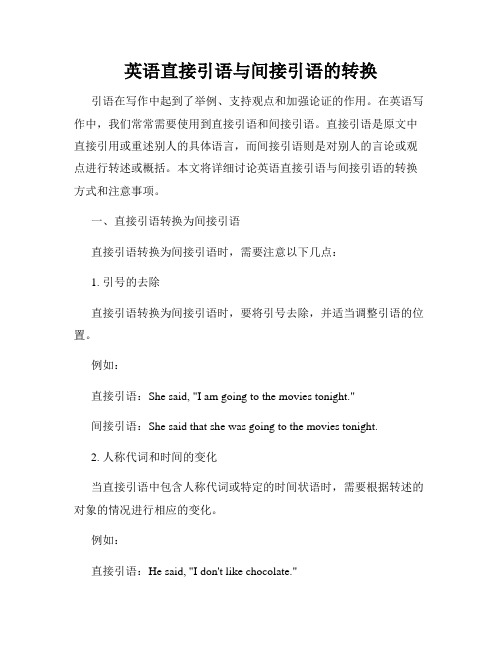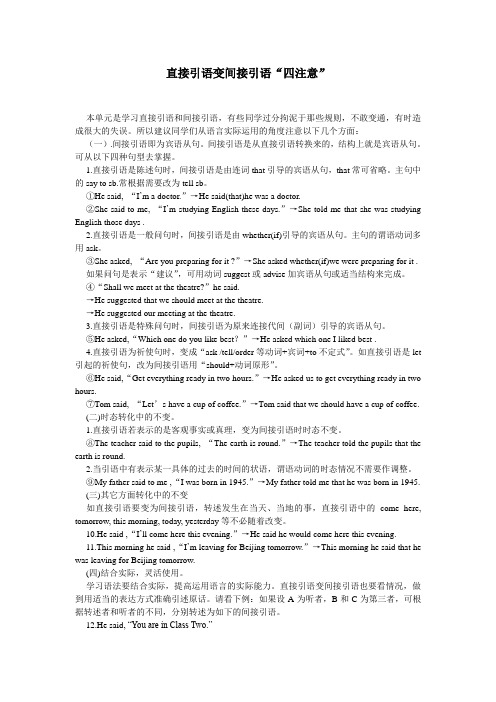英语中 直接引语转为间接引语 应该注意哪些
直接引语变间接引语需注意的几种变化

北京四中撰稿:徐正海编审:贾巍责编:任淑弘直接引语变间接引语需注意的几种变化在日常交际中,我们经常会遇到需要引用或转述别人的话的情况。
引述别人的话一般采用两种方式:一种是原封不动地引述别人的话,并将它放在引号内,称为直接引语(Direct Speech);另一种是转述别人的话,被转述的话不放在引号内,称为间接引语(Indirect Speech)。
在把直接引语变为间接引语时,原来直接引语中的人称、时态、状语、句式及主谓语序都要作相应改变。
一、注意人称的变化:1、如果从句中的主语是第一人称或被第一人称所修饰。
变为间接引语后从句中的人称要与主句中主语的人称相一致:例如:She said,“My brother wants to go with me”.→She said her brother wanted to go with her.2、如果从句中的主语及宾语是第二人称,或被第二人所修饰。
从句中的人称要跟主句的宾语一致。
例如:He said to his friend, “How is your study now?”→He asked his friend how his study was then.3、如果从句中的主语及宾语是第三人称或被第三人称所修饰时,一般不需要变化。
例如:Mr. Wang said, “Li Lei is a good student.”→Mr. Wang said Li Lei was a good student.二、注意时态的变化与一致:直接引语在改为间接引语时,时态需要做相应的调整:例如:1) She said,“I lost a pen yesterday.”→She said she had lost a pen the day before.2) Lily said,“I will go to see my parents during the holiday. ”→Lily said she would go to see her parents during the holiday.但以下几种情况,当直接引语变为间接引语时,从句的时态不需要变化。
直接引语变为间接引语的注意事项

直接引语变为间接引语一、定义直接引语:引述别人的原话。
被引用的部分放在引号里。
间接引语:用自己的话转述别人的话。
间接引语不用引号,在多数情况下是以宾语从句的形式出现的。
一、人称的变化如果直接引语的主语是第一人称,变为间接引语时,须和主句的主语保持一致;如果直接引语的主语是第二人称,变为间接引语时,须和主句的宾语保持一致;如果直接引语的主语是第三人称,变为间接引语时,人称不变。
直接引语变为间接引语时的人称变化e.g. (1) He said, “I like it very much.”→He said that he liked it very much.(2)The teacher said,“You are late.”→The teacher told me that I was late.(3)He said to me,“I’ve left my book in your room.”→He told me that he left his book in my room.二、时态的变化1 、如主句的谓语动词是一般过去时,直接引语变间接引语时,从句的谓语动词在时态方面要做相应的变化。
如主句的谓语动词是现在时,从句的时态无需变化。
间接引语时,时态不变。
e.g. (1) Mother said to me, “Seeing is believing.”→Mother told me that seeing is believing.三、时间状语的变化e.g. (1) He said, “It’s nine o’clock now.”→He said that it was nine o’clock then.(2)He said, “My sister was here three days ago.”→He said that his sister had been there three days before/earlier.(3)He said, “They will arrive the day after tomorrow.”→He said that they would arrive in two days’ time.直接引语变为间接引语时的指示代词、地点状语和动词变化→She said that she had gone there to the doctor two days before/earlier.注意:1、如果转述自己的话,第一人称则不变;转述原地发生的事,here不变成there;转述当天的事情,yesterday, tomorrow, this evening等时间状语不变。
英语直接引语与间接引语的转换

英语直接引语与间接引语的转换引语在写作中起到了举例、支持观点和加强论证的作用。
在英语写作中,我们常常需要使用到直接引语和间接引语。
直接引语是原文中直接引用或重述别人的具体语言,而间接引语则是对别人的言论或观点进行转述或概括。
本文将详细讨论英语直接引语与间接引语的转换方式和注意事项。
一、直接引语转换为间接引语直接引语转换为间接引语时,需要注意以下几点:1. 引号的去除直接引语转换为间接引语时,要将引号去除,并适当调整引语的位置。
例如:直接引语:She said, "I am going to the movies tonight."间接引语:She said that she was going to the movies tonight.2. 人称代词和时间的变化当直接引语中包含人称代词或特定的时间状语时,需要根据转述的对象的情况进行相应的变化。
例如:直接引语:He said, "I don't like chocolate."间接引语:He said that he didn't like chocolate.直接引语:She said, "I will visit my grandparents next week."间接引语:She said that she would visit her grandparents the following week.3. 动词语态的变化根据转述的对象的情况,有时需要对直接引语中的动词语态进行相应的变化。
例如:直接引语:He said, "I have finished my homework."间接引语:He said that he had finished his homework.4. 时态的变化转述的时态通常要比直接引语中的时态向过去倾斜。
例如:直接引语:She said, "I am reading a book."间接引语:She said that she was reading a book.直接引语:He said, "I will go shopping tomorrow."间接引语:He said that he would go shopping the next day.二、间接引语转换为直接引语间接引语转换为直接引语时,需要注意以下几点:1. 引号的添加将间接引语转换为直接引语时,需要在转述的部分前后添加引号。
直接引语变间接引语常用的三种情况

直接引语变间接引语常用的三种情况1、陈述句变成间接引语(1)“I am a teacher" she said.She said that she was a teacher.“You don't tell her my telephone number" he said. He said (that) I didn't tell her his telephone number.要注意时态的变化一般现在时变成一般过去时。
一般过去时变成过去完成时,现在完成时变成过去完成时,一般将来时变成过去将来时,this 变成that these变成those, here 变成there ,today变成that day, yesterday 变成the day before, tomorrow 变成next day, the day after tomorrow变成in two days' time,now 变成then等等。
2、将一般疑问句变成间接引语在这样的句子中要加“if" “是否”的意思。
(1)"Are you a student?"She asked me if I was a student.她问我是否是一位学生。
将原来的疑问句放在if 后面,但语顺变成肯定式的语顺。
另外还可以用whether 来表示。
She asked me whether I was a student.(2) "Did you finish your work yesterday?"He asked me if I have finished my work the day before.3.将特殊疑问句变成间接引语"What time is it?"He asked me what time it was."When will you go to town?"He asked me when would I go to town.在这样的句子里除疑问词放在间接引语的前面外,后面也是陈述句的语序。
直接引语变间接引语“四注意”

直接引语变间接引语“四注意”本单元是学习直接引语和间接引语,有些同学过分拘泥于那些规则,不敢变通,有时造成很大的失误。
所以建议同学们从语言实际运用的角度注意以下几个方面:(一).间接引语即为宾语从句。
间接引语是从直接引语转换来的,结构上就是宾语从句。
可从以下四种句型去掌握。
1.直接引语是陈述句时,间接引语是由连词that引导的宾语从句,that常可省略。
主句中的say to sb.常根据需要改为tell sb。
①He said, “I’m a doctor.”→He said(that)he was a doctor.②She said to me, “I’m studying English these days.”→She told me that she was studying English those days .2.直接引语是一般问句时,间接引语是由whether(if)引导的宾语从句。
主句的谓语动词多用ask。
③She asked, “Are you preparing for it ?”→She asked whether(if)we were preparing for it .如果问句是表示“建议”,可用动词suggest或advise加宾语从句或适当结构来完成。
④“Shall we meet at the theatre?”he said.→He suggested that we should meet at the theatre.→He suggested our meeting at the theatre.3.直接引语是特殊问句时,间接引语为原来连接代间(副词)引导的宾语从句。
⑤He asked,“Which one do you like best?”→He asked which one I liked best .4.直接引语为祈使句时,变成“ask /tell/order等动词+宾词+to不定式”。
英语中直接引语变为间接引语的规则

英语中直接引语变为间接引语的规则在英语语法中,直接引语和间接引语之间的相互转换是个重点也是个难点。
但是在初中英语考试中,通常考查直接引语变为间接引语。
因此,我将这个语法知识点整理如下:一,四种类型1,直接引语为陈述句,变为间接引语时用that 引导,that 也可以省略。
2,直接引语为一般疑问句,变为间接引语时用if 或whether 引导,间接引语部分要用陈述句语序。
3,直接引语为特殊疑问句,变为间接引语时用原来的疑问词引导,间接引语部分要用陈述语序。
4,直接引语为祈使句,变为间接引语时要变为由动词不定式短语构成的复合结构。
二,三大变化1,人称的变化:直接引语变间接引语时,人称的变化遵循“一主,二宾,三不变”的原则。
“一主”指第一人称应改为与主句主语一致的人称;“二宾”指第二人称应改为与主句宾语一致的人称;“三不变”指第三人称保持不变。
2,时态的变化:直接引语变间接引语时,如果主句谓语动词是一般现在时或一般将来时,间接引语的时态通常不变;若主句谓语动词是一般过去时,间接引语常变成相应的过去时态。
即:一般现在时变为一般过去时;现在进行时变为过去进行时;一般将来时变为过去将来时;一般过去时变为过去完成时;若转述的内容为客观真理,时态则不变。
3,根据需要的其他变化:指示代词有this变为that,these变为those 等;时间状语有today变为that day,yesterday变为the day before,tomorrow变为the next / following day,the day after tomorrow 变为two days later / in two days' time 等;地点状语有here 变为there 等;动词有come 变为go 等。
直接引语与间接引语的转换
直接引语与间接引语的转换在日常交流中,人们常常使用直接引语和间接引语来传递别人的言论或思想。
直接引语是指以原话形式进行传递,使用引号将其包裹起来;而间接引语则是以自己的表达方式来转述别人的话语。
掌握好直接引语和间接引语的转换技巧是写作和口语表达的基本要求之一。
直接引语转换为间接引语时,需要注意以下几点:1. 时态的变化:直接引语通常使用现在时,当转换为间接引语时,根据上下文需要,可以根据一般现在时、一般过去时、现在进行时、过去进行时来进行转换。
例如:- 直接引语:She said, "I am going to the park."间接引语:She said that she was going to the park.- 直接引语:Tom said, "I will come tomorrow."间接引语:Tom said that he would come the next day.2. 人称的变化:在转换为间接引语时,第一人称称代词通常会变为第三人称称代词。
例如:- 直接引语:John said, "I am happy."间接引语:John said that he was happy.3. 时间和地点的变化:当直接引语中涉及到具体的时间和地点时,在转换为间接引语时需相应地变化。
例如:- 直接引语:Mary said, "I will meet you here at 5 pm."间接引语:Mary said that she would meet me there at 5 pm.4. 情态动词的变化:当直接引语中含有情态动词时,需要根据情况进行相应的转换。
例如:- 直接引语:He said, "I can swim."间接引语:He said that he could swim.- 直接引语:She said, "I must leave now."间接引语:She said that she had to leave then.除了上述常用的转换规则,还有一些特殊情况需要注意。
直接引语变间接引语及其注意事项
直接引语变间接引语及其注意事项直接引语变间接引语(⼀)⼈称的转变1.直接引语中的第⼀⼈称,⼀般转换为第三⼈称,如:He said,“I am very sorry. ”He said that he was very sorry.2.直接引语中的第⼆⼈称,如果原话是针对转述⼈说的,转换为第⼀⼈称,如:“You should be more careful next time, ”my father told me.My father told me that I should be morecareful the next time.3.直接引语中的第⼆⼈称,如果原话是针对第三⼈称说的,转换成第三⼈称。
如:She said to her son, “I'll check your homework tonight. ”She said to her son that she would checkhis homework that night.4.⼈称的转换包括⼈称代词、物主代词和名词性物主代词等,如:He asked me, “Will you go to the station with me to meet a friend of mine this after noon?”He asked me whether I would go to the station with him to meet a friend of his that afternoon.总之,⼈称的转换不是固定的,具体情况,具体对待,要符合逻辑。
(⼆)时态的转换直接引语改为间接引语时,主句中的谓语动词如果是过去时,从句(即间接引语部分)的谓语动词在时态⽅⾯要作相应的变化,变成过去时范畴的各种时态(实际也是宾语从句的时态要求),变化如下:⼀般现在时⼀般过去时现在进⾏时过去进⾏时现在完成时过去完成时⼀般将来时过去将来时⼀般过去时过去完成时过去完成时不变过去进⾏时不变如:1.“I am very glad to visit your school”, shesaid.She said she was very glad to visit ourschool.2.Tom said, “We are listening to the pop music. ”Tom said that they were listening to the pop music.3.Mother asked, “Have you finished your homework before you watch TV?”Mother asked me whether I had finished my homework before I watched TV.4.He asked the conductor, “Where shall I get off to change to a No. 3 bus?”He asked the conductor where he would get off to change to a No. 3 bus.5.“Why did she refuse to go there?”the teacher asked.The teacher asked why she had refused to go there.6.Mother asked me, “Had you finished your homework before you watched TV?”Mother asked me whether I had finished my homework before I watched TV.7.Tom said, “We were having a football match this time yesterday. ”Tom said that they were having a football match that time the day before.8.He said,“I haven't heard from my parents these days. ”He said that he hadn't heard from his parents those days.(三)时间状语、地点状语的变化1.直接引语是客观事实、普遍真理等,主句尽管是过去时态,变成间接引语时,时态仍然⽤⼀般现在时态。
英语中直接引语变为间接引语的规则
英语中直接引语变为间接引语的规则在英语语法中,直接引语和间接引语之间的相互转换是个重点也是个难点。
但是在初中英语考试中,通常考查直接引语变为间接引语。
因此,我将这个语法知识点整理如下:一,四种类型1,直接引语为陈述句,变为间接引语时用that 引导,that 也可以省略。
2,直接引语为一般疑问句,变为间接引语时用if 或whether 引导,间接引语部分要用陈述句语序。
3,直接引语为特殊疑问句,变为间接引语时用原来的疑问词引导,间接引语部分要用陈述语序。
4,直接引语为祈使句,变为间接引语时要变为由动词不定式短语构成的复合结构。
二,三大变化1,人称的变化:直接引语变间接引语时,人称的变化遵循“一主,二宾,三不变”的原则。
“一主”指第一人称应改为与主句主语一致的人称;“二宾”指第二人称应改为与主句宾语一致的人称;“三不变”指第三人称保持不变。
2,时态的变化:直接引语变间接引语时,如果主句谓语动词是一般现在时或一般将来时,间接引语的时态通常不变;若主句谓语动词是一般过去时,间接引语常变成相应的过去时态。
即:一般现在时变为一般过去时;现在进行时变为过去进行时;一般将来时变为过去将来时;一般过去时变为过去完成时;若转述的内容为客观真理,时态则不变。
3,根据需要的其他变化:指示代词有this变为that,these变为those 等;时间状语有today变为that day,yesterday变为the day before,tomorrow变为the next / following day,the day after tomorrow 变为two days later / in two days' time 等;地点状语有here 变为there 等;动词有come 变为go 等。
直接引语变间接引语常用的三种情况
直接引语变间接引语常用的三种情况1、陈述句变成间接引语(1)“I am a teacher” she said。
She said that she was a teacher.“You don’t tell her my telephone number” he said。
He said (that)I didn't tell her his telephone number。
要注意时态的变化一般现在时变成一般过去时。
一般过去时变成过去完成时,现在完成时变成过去完成时,一般将来时变成过去将来时,this 变成that these变成those,here 变成there ,today 变成that day, yesterday 变成the day before,tomorrow 变成next day, the day after tomorrow变成in two days’ time,now 变成then等等.2、将一般疑问句变成间接引语在这样的句子中要加“if” “是否"的意思.(1)”Are you a student?"She asked me if I was a student。
她问我是否是一位学生。
将原来的疑问句放在if 后面,但语顺变成肯定式的语顺. 另外还可以用whether 来表示。
She asked me whether I was a student.(2) "Did you finish your work yesterday?”He asked me if I have finished my work the day before.3.将特殊疑问句变成间接引语”What time is it?”He asked me what time it was。
"When will you go to town?”He asked me when would I go to town。
- 1、下载文档前请自行甄别文档内容的完整性,平台不提供额外的编辑、内容补充、找答案等附加服务。
- 2、"仅部分预览"的文档,不可在线预览部分如存在完整性等问题,可反馈申请退款(可完整预览的文档不适用该条件!)。
- 3、如文档侵犯您的权益,请联系客服反馈,我们会尽快为您处理(人工客服工作时间:9:00-18:30)。
英语中直接引语转为间接引语应该注意哪些直接引语和间接引语详解引述或转述别人的话称为“引语”。
直接引用别人的原话,两边用引号“ “标出,叫做直接引语;用自己的语言转述别人的话,不需要引号这叫做间接引语,实际上间接引语大都是宾语从句(其中由祈使句转换的间接引语除外,其转换后是不定式)。
那么直接引语为陈述句、一般疑问句、特殊疑问句和祈使句,转换为间接引语时,句子的结构,人称、时态、时间状语和地点状语等都要有变化,如何变化呢?1、人称的转变1)直接引语中的第一人称,一般转换为第三人称,如:He said,“I am very sorry.” ——>He said that he was very sorry.2)直接引语中的第二人称,如果原话是针对转述人说的,转换为第一人称,如:“You should be more careful next time,” my father told me.——>My father told me that I should be more careful the next time.3)直接引语中的第二人称,如果原话是针对第三人称说的,转换成第三人称。
如:She said to her son, “I'll check your homework tonight.” ——>She said to her son that she would check his homework that night.4)人称的转换包括人称代词、物主代词和名词性物主代词等,如:He asked me, “Will you go to the station with me to meet a friend of mine this afternoon?” ——>He asked me whether I would go to the station with him to meet a friend of his that afternoon.总之,人称的转换不是固定的,具体情况,具体对待,要符合逻辑。
2、时态的转换直接引语改为间接引语时,主句中的谓语动词如果是过去时,从句(即间接引语部分)的谓语动词在时态方面要作相应的变化,变成过去时范畴的各种时态(实际也是宾语从句的时态要求),变化如下:直接引语间接引语直接引语间接引语一般现在时一般过去时一般过去时过去完成时现在进行时过去进行时过去完成时过去完成时现在完成时过去完成时过去进行时过去进行时一般将来时过去将来时例如:“I am very glad to visit your school”, she said. ——>She said she was very glad to visit our school.Tom said, “We are listening to the pop music.” ——>Tom said that they were listening to the pop music.Mother asked, “Have you finished your homework before you watch TV?” ——>Mother asked me whether I had finished my homework before I watched TV.He asked the conductor, “Where shall I get off to change to a No. 3 bus?” ——>He asked the conductor where he would get off to change to a No. 3 bus.“Why did she refuse to go there?” the teacher asked. ——>The teacher asked why she had refused to go there.Mother asked me, “Had you finished your homework before you watched TV?” ——>Mother asked me whether I had finished my homework before I watched TV.Tom said, “We were having a football match this time yesterday.” ——>Tom said that they were having a football match that time the day before.He said,“I haven't heard from my parents these days.” ——>He said that he hadn't heard from his parents those days.3、直接引语变成间接引语时,从句时态无须改变的情况1)当主句的谓语动词是一般现在时的时候,如:He always says, “I am tired out.” ——>He always says that he is tired out.2)当主句的谓语动词是将来时的时候,如:He will say, “I’ll try my best to help you.” ——>He will say that he will try his best to help me.3)当直接引语部分带有具体的过去时间状语时,如:He said, “I went to college in 1994.” ——>He told us that he went to college in 1994.4)当直接引语中有以when, while引导的从句,表示过去的时间时,如:He said,“When I was a child, I usually played football after school.” ——>He said that when he was a child, he usually played football after school.5)当直接引语是客观真理或自然现象时,如:Our teacher said to us, “Light travels faster than sound.” ——>Our teacher told us that light travels faster than sound.6)当引语是谚语、格言时,如:He said,“Practice makes perfect.” ——>He said that practice makes perfect.7)当直接引语中有情态动词should, would, could, had better, would rather, might, must, ought to, used to, need时,如:例如:The doctor said, “You'd better drink plenty of water.” ——>The doctor said I'd better drink plenty of water.He said, “She must be a teacher.”——> He said that she must be a teacher.He said, “She ought to have arrived her office by now.”——>He said that she ought to have arrived her office by then.The teacher said, “You needn't hand in your compositions today.”——>The teacher said we needn't/didn't need to/didn't have to hand in our compositions.She asked, “Must I take the medicine?”——> She asked if she had to take the medicine.〔注〕:此处用had to代替must更好8)此外转述中的变化要因实际情况而定,不能机械照搬,如果当地转述,here不必改为there, 动词come 不必改为go,如果当天转述yesterday, tomorrow, this afternoon等均不必改变。
如:Teacher: You may have the ball game this afternoon.Student : What did the teacher say, Monitor?Monitor: He said we might have the ball game this afternoon.4、时间状语、地点状语及某些对比性的指示代词和动词变化1)时间状语:直接引语间接引语直接引语间接引语now then tomorrow the next(following)daytoday that day next week the next(following)week(month, year)yesterday the day before two days ago two days beforelast week (month, year)the week(month, year)before this week that week(month, year)2)指示代词:these 变成those3)地点状语:here变成thereShe said, “I won't come here any more.”——> She said that she wouldn’t go there any more..4)动词:come变成go,bring变成take5、直接引语变成间接引语,句子结构的变化1)陈述句。
用连词that引导,that在口语中常省略。
主句的谓语动词可直用接引语中的said, 也可用told 来代替,注意,可以说said that, said to sb. that, told sb. that,不可直接说told that, 如:He said, “I have been to the Great Wall.” ——>He said to us that he had been to the Great Wall.He said, “I'll give you an examination next Monday.”——>He told us that he would give us an examination the next Monday.(不可说told that)此外主句中的谓语还常有:repeat, whisper, answer, reply, explain, announce, declare, think等,又如:He said,“I'm late because of the heavy traffic.”——> He explained to us that he was late because of the heavy traffic.如果间接引语是由that引导的两个或两个以上的并列从句,第一个连词可以省略,以后的连词一般不省略,以免混乱。
